I speak: ‘Give for me stay, because I was in the army, I have papers for it!’ But they say ‘We take you to police station.'
| 28.10.2021 | 45.022839, 15.765457, around 6km southwest of the Bosnian town of Šturlić | No Name Kitchen | 45.022839, 15.765457 | Croatia | Bosnia | yes | no | yes | yes | no | no | 17 - 25 | 6 | Afghanistan, Pakistan | detention, photos taken, personal information taken, papers signed, no translator present, denial of food/water | 23 | beating (with batons/hands/other), exposure to air condition and extreme temperature during car ride, pepper spray, water immersion, destruction of personal belongings, theft of personal belongings | 6 male presumably Croatian SJP in 2 camouflage green estate cars; 10-11 male and 1 female Croatian police in midnight blue uniform and 2 white police van; 6-7 possibly Croatian EPZ Intervention police in black uniform with protection pads and balaclavas |
On Monday, the 27th of October, around 8 pm, a transit group of six men from Pakistan and Afghanistan was apprehended by Croatian authorities in a forested area around one or two kilometers south of the Croatian town of Turke, which borders Slovenia.
Starting this transit attempt, they had been a group of 44, containing apart from mostly Pakistani people also seven to eight men from Afghanistan and two to three men from Bangladesh. Two of the group had already turned back to the Bosnian town of Bihac, where they had started from while crossing the mountains at the Bosnia-Croatian border at night. The 21-year old respondent, from the Pashtun region of Afghanistan, could not recall the exact nature of their problems, as he said he was not in direct contact with them. The leftover transit group of 42 had continued through all of Croatia and was then planning to cross the river Kolpa, which runs along the border between Croatia and Slovenia south of Kočevje and Črnomelj, later in the night, and built a makeshift camp to rest for some hours in the forest around one to two kilometers south, according to the respondent 20 minutes walking distance, from the border.
[caption id="attachment_18935" align="alignnone" width="500"]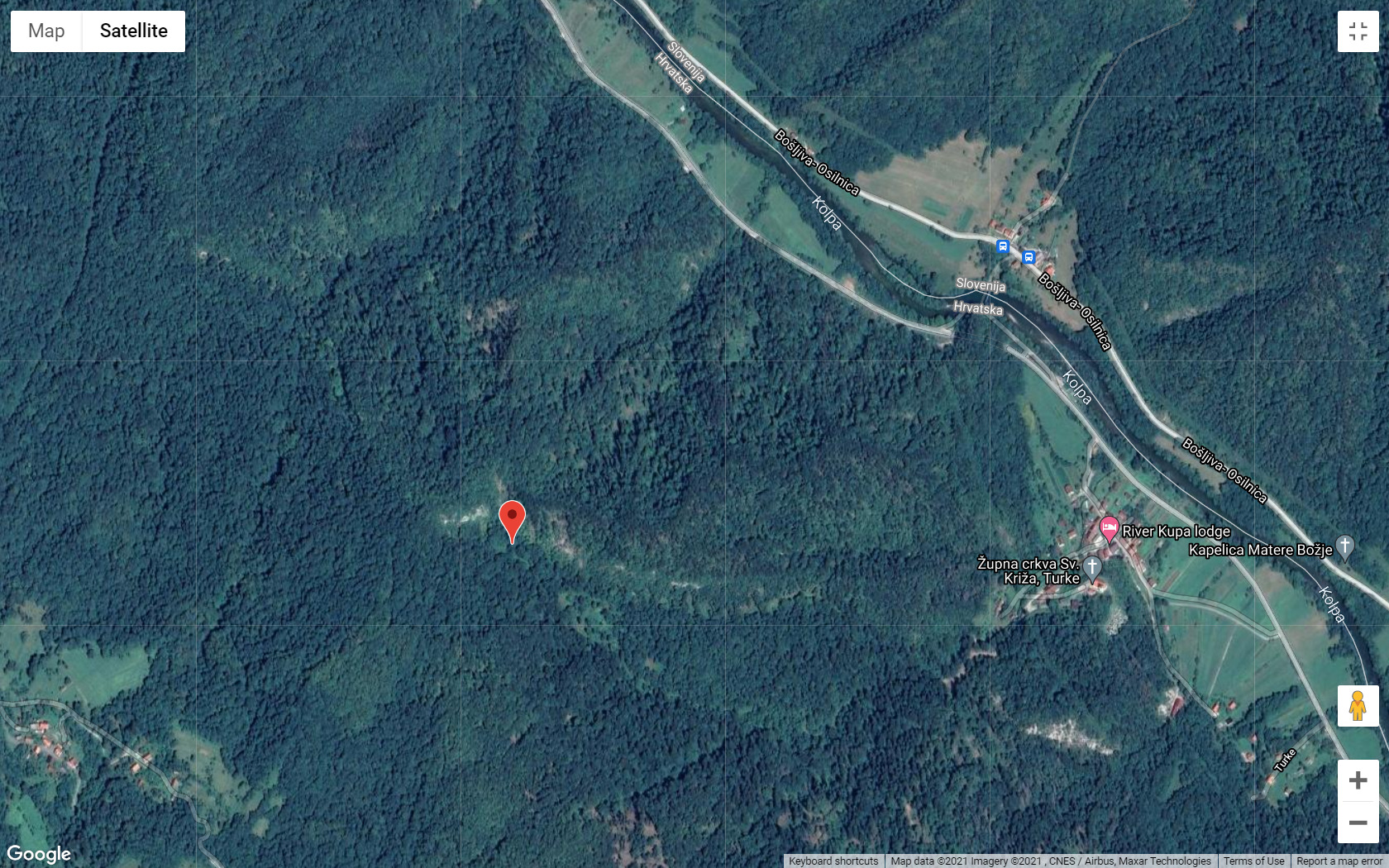 Satellite picture of the forest site close to the border the transit group was apprehended at, close to the river Kolpa marking the Croatian-Slovenian border (rough coordinates 45.515214, 14.739223).[/caption]
Shortly after having made camp, around 8 pm members of the transit group not yet asleep were alarmed as they caught sight of flashlights, which lead them to quickly put on their shoes again, take their bags and run towards the border. The six men, two from Afghanistan and four from Pakistan, who form the group affected by this pushback, however, were already resting in their sleeping bags. The respondent related that the six of them, especially, had grown too physically unstable and exhausted from the past eleven full days of walking that were laying behind them. The last three days of their journey had been full of rain, and as only a few possessed enough rain gear, their clothes and almost all of their belongings were full of water in the cold which prevented them from sleeping. Concerning the 21-year old respondent, especially the area around the big toe of his left foot had swollen and he suffered great pain while walking.
[caption id="attachment_18936" align="alignnone" width="500"]
Satellite picture of the forest site close to the border the transit group was apprehended at, close to the river Kolpa marking the Croatian-Slovenian border (rough coordinates 45.515214, 14.739223).[/caption]
Shortly after having made camp, around 8 pm members of the transit group not yet asleep were alarmed as they caught sight of flashlights, which lead them to quickly put on their shoes again, take their bags and run towards the border. The six men, two from Afghanistan and four from Pakistan, who form the group affected by this pushback, however, were already resting in their sleeping bags. The respondent related that the six of them, especially, had grown too physically unstable and exhausted from the past eleven full days of walking that were laying behind them. The last three days of their journey had been full of rain, and as only a few possessed enough rain gear, their clothes and almost all of their belongings were full of water in the cold which prevented them from sleeping. Concerning the 21-year old respondent, especially the area around the big toe of his left foot had swollen and he suffered great pain while walking.
[caption id="attachment_18936" align="alignnone" width="500"] Picture of the respondent’s left foot, of which the big toe had swollen causing strong pain while walking, which led him to lose guard and rest in his tent around the time of apprehension.[/caption]
They leftover group was then apprehended by what the respondent reported were six male officers, all carrying guns, in army green shirts and pants, who had arrived in two estate cars in green camouflage pattern. On their uniform, according to the respondent, it did not visibly say police. At the moment of apprehension, they had been sleeping a small distance apart from each other, three each on two different sides of the makeshift camp they had made in the forest. The respondent was one of the three people sleeping in a tent while the other three were just resting in their sleeping bags on the ground. He said the officers first approached his side of the camp, then another set of officers the other side. The respondent remembered the officers coming for his side having their guns pointed at them, saying “Hands up!”. In one hand, reportedly, they were carrying a pistol, while in the other a long baton, threatening them that if they ran they would beat them on the head. The respondent also reported being beaten two to three times on the shoulder blades, leaving bruises, while officers were telling him to sit down. Releasing the safety of their guns, the officers said:
Picture of the respondent’s left foot, of which the big toe had swollen causing strong pain while walking, which led him to lose guard and rest in his tent around the time of apprehension.[/caption]
They leftover group was then apprehended by what the respondent reported were six male officers, all carrying guns, in army green shirts and pants, who had arrived in two estate cars in green camouflage pattern. On their uniform, according to the respondent, it did not visibly say police. At the moment of apprehension, they had been sleeping a small distance apart from each other, three each on two different sides of the makeshift camp they had made in the forest. The respondent was one of the three people sleeping in a tent while the other three were just resting in their sleeping bags on the ground. He said the officers first approached his side of the camp, then another set of officers the other side. The respondent remembered the officers coming for his side having their guns pointed at them, saying “Hands up!”. In one hand, reportedly, they were carrying a pistol, while in the other a long baton, threatening them that if they ran they would beat them on the head. The respondent also reported being beaten two to three times on the shoulder blades, leaving bruises, while officers were telling him to sit down. Releasing the safety of their guns, the officers said:
“If you run, we will fire the gun at you.”One of these officers then stayed with the respondents, holding them in custody as the other five ran after the larger part of the group that had left already. The respondent and his group were asked where they were coming from and what their route was and how many they were; the respondent answered “40”. The other questions the officers answered themselves by taking the transit group’s phone and checking their maps on it. The river Kolpa, where the other 36 crossed into Slovenia, did not reach up much higher than their knees, and so this other part of the transit group crossed the river on foot to the Slovenian side, upon which the apprehending officers apparently stopped following them and turned back into Croatia to return to the respondent’s part of the group. The respondent remembered the officer holding them talking to other officers over a black walkie-talkie, who apparently asked him where the other people of the group were and how many people he had caught. The man reportedly answered “Six, the others crossed the border.” The other 36 of the transit group were by then continuing; some of which the respondent related he had just spoken to, who had as of the time of this interview already reached Trieste in Italy. [caption id="attachment_18873" align="alignnone" width="900"]
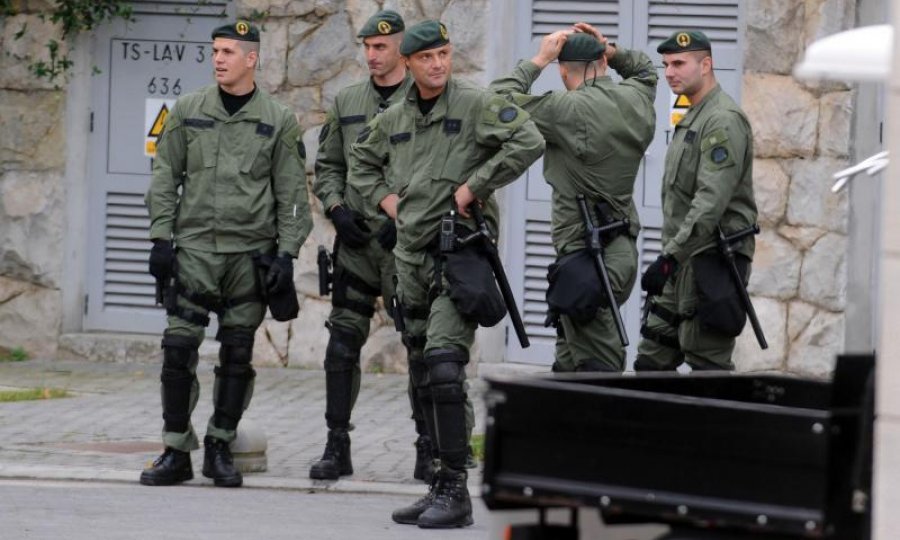 Members of the Croatian Specijalna Jednica Policija (SJP), who have been reported to catch transit groups in forest areas and resemble the respondents’ description of their apprehenders (source).[/caption]
The officers in army green clothing also asked the remaining transit group where they were from, the respondent answered they were from Afghanistan and that they were facing big problems. The officers then asked “Which problem?”, upon which the respondent related that he was a former member of the countries’ army and was facing life-threatening problems with the new Taliban government, and asked them for asylum, saying he had documents proving he served in the military. Only one of the officers was speaking, saying this wasn’t his job and he had to give them to other people who would drive them to the police station.
Members of the Croatian Specijalna Jednica Policija (SJP), who have been reported to catch transit groups in forest areas and resemble the respondents’ description of their apprehenders (source).[/caption]
The officers in army green clothing also asked the remaining transit group where they were from, the respondent answered they were from Afghanistan and that they were facing big problems. The officers then asked “Which problem?”, upon which the respondent related that he was a former member of the countries’ army and was facing life-threatening problems with the new Taliban government, and asked them for asylum, saying he had documents proving he served in the military. Only one of the officers was speaking, saying this wasn’t his job and he had to give them to other people who would drive them to the police station.
“I speak: ‘Give for me stay, because I was in the army, I have papers for it!’ But they say ‘We take you to police station."While their cars were left in the forest, the men then called for another car, a white van, having written “Policija” in what the respondent saw as a shade of black on it, which arrived after two hours in which they had to sit quietly on the ground. While waiting, the respondent related, they asked the officers for food and water but the men refused, only saying another car would come and take them to the police station.
“I speak can you give to me food, water? They speak ‘No, no, car is coming. You go to the police station.'”The men in green uniforms, presumably part of the Croatian Specijalna Jednica Policija, also confiscated their phones, putting them into plastic bags, which they then handed over to the officers arriving in the new car. While doing so the officers told the transit group their phones would be returned to them upon their pushback to Bosnia. According to the respondent, however, they were never returned. The officers who then came in the van sprayed them with pepper spray into their face before putting them in the back of the van and closing the door. These two male officers reportedly had ‘Policija’ written in golden color on the left chest part of their long-sleeve midnight blue uniforms and also wore midnight blue pants. There also was something else written on their uniform which the respondent was unable to remember as it was Croatian words which he did not understand. The respondent referred to them as “Zagreb police”, because he saw the letters “ZG” on the left of their license plate and because they then drove them to a police station in the city of Zagreb, in a journey that the respondent said lasted around four hours. The respondent also tried to make the officers aware of his foot pain and other medical conditions of the group, but they reportedly ignored him.
“I said: ‘I have a medical problem!’ They said ‘No, no.”At the reportedly relatively big police station, the transit group had pictures of them taken, one by one. They each had to hold a piece of carton in front of their chest which had their name written on it, which they were forced to do and without being asked permission, they merely told them to “Sit here”, and took the photo. They also had to sign documents with what the respondent recalled as seven signatures, and fill out documents on which they also had to give their addresses. In total he spoke of three papers, two of them in Croatian, one in Farsi which the respondent was able to understand. These procedures according to the respondent lasted up to three hours. The transit group was held at the police station for around 24 hours, where they were put to wait in a detention cell in the basement without windows and a small toilet, which was openly contained in the room without possible privacy. Each person of the group was given one bottle of water and a bar of chocolate. When they asked to have their own food, they were not allowed access to their bags, which had been confiscated. In between the handover of the group and these procedures, the respondent said he was able to sleep around three hours in the detention cell before the officers woke him up again. At the police station the respondent said they had contact with one female and four to five male Croatian officers, who were wearing the same uniform as the ones who had driven them in the van; and checked everybody’s clothes and bags. They had all their belongings put on one table, meaning their phones, power banks, bags and money, which were checked and then put into plastic bags.
“They said ’After you’re deported, we’ll give you your money and your telephones.’ I said okay.”The respondent said their sleeping bags and additional clothes, including some of their jackets, were thrown into the garbage; the money and telephones the officers reportedly kept for themselves and did not return the day after: “I spoke ‘Give me my telephone!’ They said ‘No, no. Go, go!’” Around 24 hours after their arrival at the police station another van arrived, also white saying ‘Policija’ in black written on it, with another set of two officers wearing the same uniforms as the Zagreb officers. They asked the officers driving whether they would be “deported” tomorrow. The officers, however, answered, “No, we deport you now.” From the station the respondent remembered they were driven for 20 to 30 minutes to another place in the Zagreb area, where they waited one hour in the back of the van in a parking lot, and the two men driving the van until then were exchanged with two new police officers. After this, they were driven for about three hours to the Bosnia-Croatian border around six kilometers southwest of Šturlić, where they arrived at 11 pm in the night. The respondent remarked that in all of the police vans it was very cold, which the officers reportedly had even augmented by using the air conditioning on the cool setting, while they were freezing with only one jacket and pair of trousers, their other jackets and sleeping bags having been taken away at the station. The site they had been driven to was a green border area, on which they encountered a small road leading through the forest. They then encountered what he remembered as six to seven officers coming out of two white stationary containers, there the respondent related also normal-sized police cars were present. He suspected from what he heard that there were more than ten of them, and that the rest of this group was not visible because they had remained within the small container houses. He related that they presumably served different shifts, with one group of around six officers each alternatingly on duty while the other was resting in the containers, which he said were more than four meters wide and also contained beds. [caption id="attachment_18952" align="alignnone" width="500"]
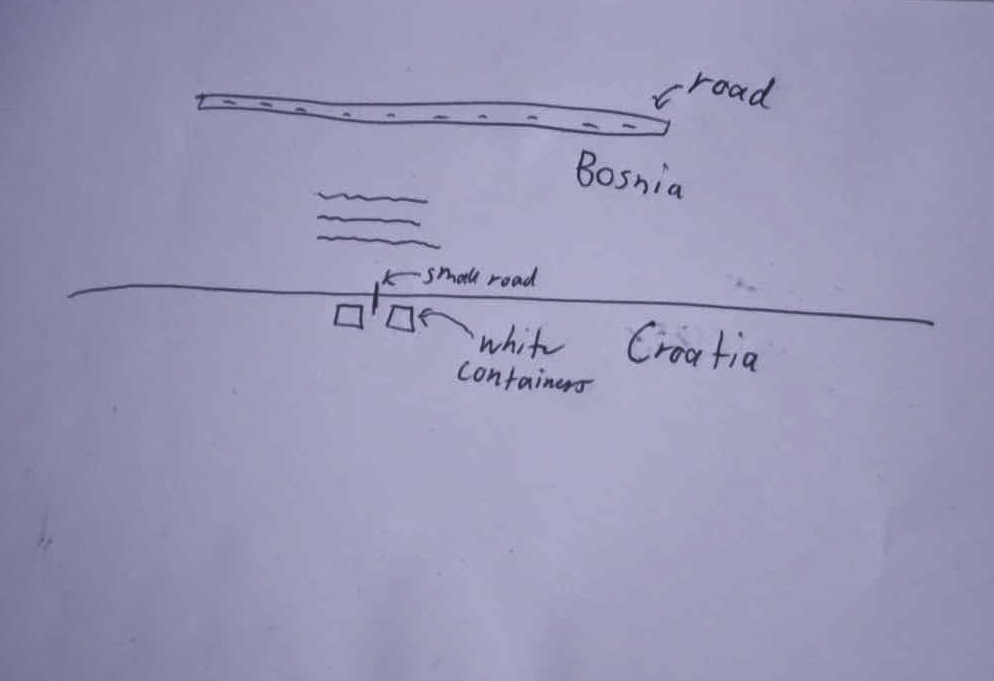 Drawing made together with the respondent to illustrate the layout of the border around the three streams of water before the R403b road (legends added by the interviewer).[/caption]
These officers - which the respondent referred to as ‘border police’, as he said this was also written on the chests of their uniforms in a golden color - reportedly, wore a different uniform, being all black, with protective pads covering their torsos; wore masks covering their faces, and were each carrying black batons about one meter long. The two officers who had brought them to the border did not participate in the direct pushback, but only closed the doors of their van again and drove away.
The officers positioned themselves on both sides of the transit group, bringing them to the water border, and told the respondent’s group “Go to Bosnia!” While doing so, and forcing the group to run over the border through the Korana river, they reportedly beat each of the six of them with their batons, one by one, on the back of their shoulders and back of their calves, leaving bruises. The respondent, when asked, remembered being beaten on his shoulder two to three times with the baton.
[caption id="attachment_18714" align="alignnone" width="500"]
Drawing made together with the respondent to illustrate the layout of the border around the three streams of water before the R403b road (legends added by the interviewer).[/caption]
These officers - which the respondent referred to as ‘border police’, as he said this was also written on the chests of their uniforms in a golden color - reportedly, wore a different uniform, being all black, with protective pads covering their torsos; wore masks covering their faces, and were each carrying black batons about one meter long. The two officers who had brought them to the border did not participate in the direct pushback, but only closed the doors of their van again and drove away.
The officers positioned themselves on both sides of the transit group, bringing them to the water border, and told the respondent’s group “Go to Bosnia!” While doing so, and forcing the group to run over the border through the Korana river, they reportedly beat each of the six of them with their batons, one by one, on the back of their shoulders and back of their calves, leaving bruises. The respondent, when asked, remembered being beaten on his shoulder two to three times with the baton.
[caption id="attachment_18714" align="alignnone" width="500"]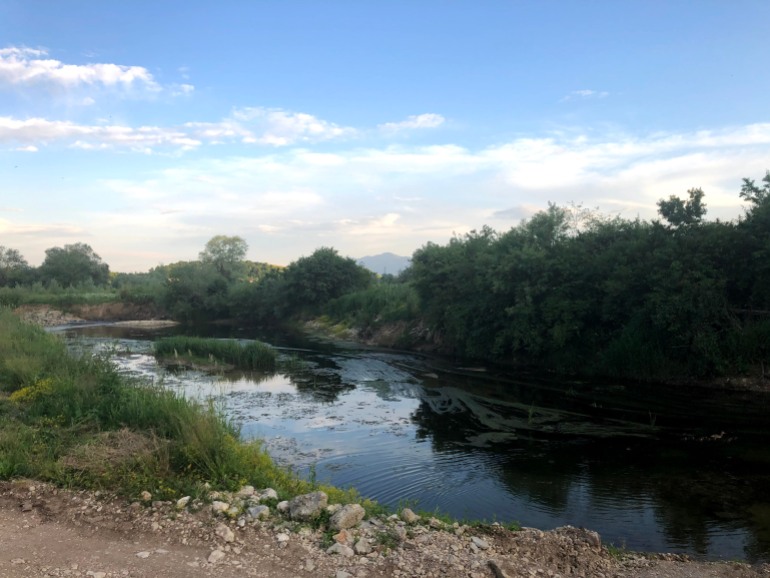 A picture of the Korana river close to Sturlic, which marks the border between Bosnia and Croatia and which the group was forced to cross on foot. (source)[/caption]
The officers, unknown whether by intention or not, seemed to have picked the spot to cross the river in exactly the way that, running straight, the group had to cross the water, which was reaching up to their torsos, three times. Shortly after this, and walking for a couple of hundred through some fields, they then reached the main road, the R403b, leading back south to the Bosnian town of Bihać, where the group had started their transit attempt.
[caption id="attachment_18953" align="alignnone" width="500"]
A picture of the Korana river close to Sturlic, which marks the border between Bosnia and Croatia and which the group was forced to cross on foot. (source)[/caption]
The officers, unknown whether by intention or not, seemed to have picked the spot to cross the river in exactly the way that, running straight, the group had to cross the water, which was reaching up to their torsos, three times. Shortly after this, and walking for a couple of hundred through some fields, they then reached the main road, the R403b, leading back south to the Bosnian town of Bihać, where the group had started their transit attempt.
[caption id="attachment_18953" align="alignnone" width="500"]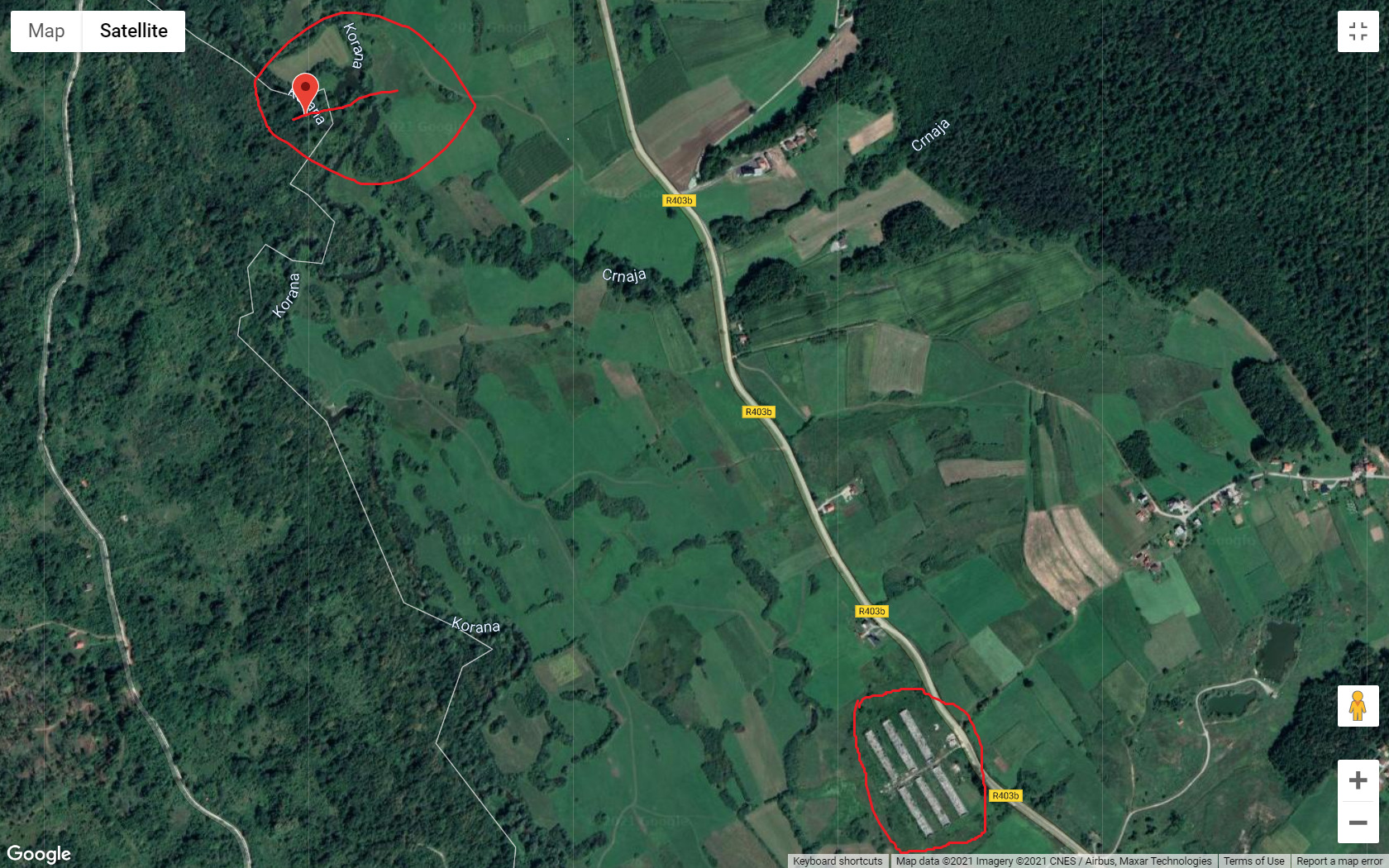 A satellite picture of the area of the pushback site; on the top left a line of the way the respondent presumably walked through the separate flows of water the transit group had to cross where the Korana river splits up for a short distance; on the bottom right the concrete structure the respondent related he rest in for around two hours (taken from Google Maps).[/caption]
A satellite picture of the area of the pushback site; on the top left a line of the way the respondent presumably walked through the separate flows of water the transit group had to cross where the Korana river splits up for a short distance; on the bottom right the concrete structure the respondent related he rest in for around two hours (taken from Google Maps).[/caption]
“I was coming through water. One water, two water, three water.”The respondent, still wet, and reportedly barely having been able to sleep for the last four days and then unexpectedly driven to the border in the middle of the night, then tried to sleep for around two hours in an empty big concrete structure next to the R403b road around a kilometer south of the pushback site, before he started walking back south to Bihać again around 2am, where he then arrived in the center the next day, on the 29th of October - on which this testimony was recorded - at 3am in the night.
“This water, big problem. I have no kandwhala [Pashtun term for broken home, to sleep], no jacket, no food, I have no money.”On the way he sought out some shops, trying to get something to eat as he had only had the one chocolate bar in over a day due to detention, but was refused as he was unable to pay without money.
